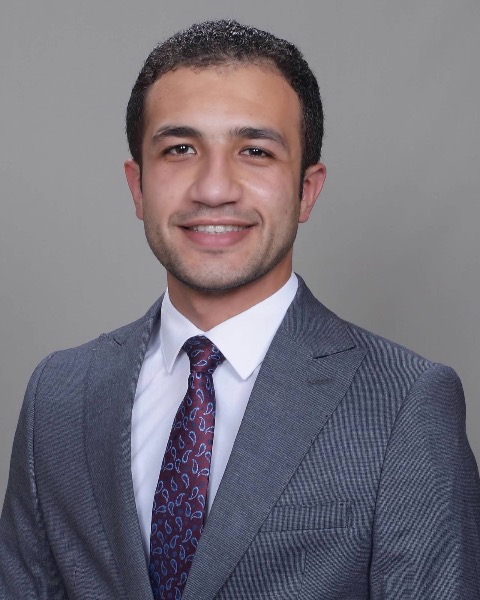Tuesday Poster Session
Category: General Endoscopy
P5145 - Delayed Emergence From Anesthesia After EGD/Colonoscopy in a Patient With Undiagnosed Narcolepsy
Tuesday, October 28, 2025
10:30 AM - 4:00 PM PDT
Location: Exhibit Hall

Abdelrhman Refaey, MD
Division of Gastroenterology and Liver Disease, Department of Medicine, George Washington University School of Medicine and Health Sciences
Teaneck, NJ
Presenting Author(s)
Award: ACG Presidential Poster Award
Abdelrhman Refaey, MD, Adam Jacob, DO, Marie L. Borum, MD, EdD, MPH, FACG
Division of Gastroenterology and Liver Disease, Department of Medicine, George Washington University School of Medicine and Health Sciences, Washington, DC
Introduction: Endoscopic procedures such as EGD and colonoscopy are routinely performed under propofol-based anesthesia due to its rapid onset and recovery. However, delayed emergence from anesthesia remains a rare but serious concern, particularly in patients with underlying neurological disorders such as narcolepsy. Narcolepsy is a sleep disorder characterized by dysfunction of the orexinergic system, which plays a critical role in wakefulness regulation. This case highlights the importance of preoperative screening for sleep disorders in patients undergoing routine gastrointestinal (GI) procedures, as undiagnosed narcolepsy can significantly impact sedation recovery and procedural safety.
Case Description/
Methods: A 28-year-old female with a BMI of 35.8 and history of hypothyroidism, polycystic ovarian syndrome, and irritable bowel syndrome, was referred for endoscopic evaluation of iron deficiency anemia. She had normal vital signs, and her cardiac, pulmonary, abdominal and neurologic exams were unremarkable. An EGD and colonoscopy didn’t reveal an etiology for her anemia. She received lidocaine 80 mg IV, then propofol 900 mg IV over 45 minutes. She exhibited persistent sedation in the recovery room. Evaluation included normal labs (CBC, electrolytes, ABG), EKG and neurologic imaging (head CT angiogram and perfusion). She was transferred to the ICU for continued monitoring where she gradually regained consciousness over 10 hours, achieving normal neurologic exam without intervention. Prior to discharge she and her family disclosed that she had a history of narcolepsy which was not mentioned during pre-procedure evaluation.
Discussion: Delayed emergence from anesthesia in narcoleptic patients is rarely reported in the GI literature. It has significant implications for endoscopic sedation protocols. Narcolepsy can alter responses to anesthetic agents leading to prolonged sedation and impaired arousal mechanisms. Prior cases suggest that preoperative modafinil or dextroamphetamine may facilitate faster emergence in those patients. Additionally, propofol metabolism abnormalities or enzyme deficiencies should be considered in cases of prolonged sedation. This case underscores the critical need for detailed pre-procedural history-taking, including prior anesthesia responses and undiagnosed sleep disorders, to prevent unexpected post-sedation complications. Gastroenterologists and anesthesiologists should collaborate to optimize sedation strategies, particularly in patients with suspected or known narcolepsy.
Disclosures:
Abdelrhman Refaey indicated no relevant financial relationships.
Adam Jacob indicated no relevant financial relationships.
Marie Borum indicated no relevant financial relationships.
Abdelrhman Refaey, MD, Adam Jacob, DO, Marie L. Borum, MD, EdD, MPH, FACG. P5145 - Delayed Emergence From Anesthesia After EGD/Colonoscopy in a Patient With Undiagnosed Narcolepsy, ACG 2025 Annual Scientific Meeting Abstracts. Phoenix, AZ: American College of Gastroenterology.
Abdelrhman Refaey, MD, Adam Jacob, DO, Marie L. Borum, MD, EdD, MPH, FACG
Division of Gastroenterology and Liver Disease, Department of Medicine, George Washington University School of Medicine and Health Sciences, Washington, DC
Introduction: Endoscopic procedures such as EGD and colonoscopy are routinely performed under propofol-based anesthesia due to its rapid onset and recovery. However, delayed emergence from anesthesia remains a rare but serious concern, particularly in patients with underlying neurological disorders such as narcolepsy. Narcolepsy is a sleep disorder characterized by dysfunction of the orexinergic system, which plays a critical role in wakefulness regulation. This case highlights the importance of preoperative screening for sleep disorders in patients undergoing routine gastrointestinal (GI) procedures, as undiagnosed narcolepsy can significantly impact sedation recovery and procedural safety.
Case Description/
Methods: A 28-year-old female with a BMI of 35.8 and history of hypothyroidism, polycystic ovarian syndrome, and irritable bowel syndrome, was referred for endoscopic evaluation of iron deficiency anemia. She had normal vital signs, and her cardiac, pulmonary, abdominal and neurologic exams were unremarkable. An EGD and colonoscopy didn’t reveal an etiology for her anemia. She received lidocaine 80 mg IV, then propofol 900 mg IV over 45 minutes. She exhibited persistent sedation in the recovery room. Evaluation included normal labs (CBC, electrolytes, ABG), EKG and neurologic imaging (head CT angiogram and perfusion). She was transferred to the ICU for continued monitoring where she gradually regained consciousness over 10 hours, achieving normal neurologic exam without intervention. Prior to discharge she and her family disclosed that she had a history of narcolepsy which was not mentioned during pre-procedure evaluation.
Discussion: Delayed emergence from anesthesia in narcoleptic patients is rarely reported in the GI literature. It has significant implications for endoscopic sedation protocols. Narcolepsy can alter responses to anesthetic agents leading to prolonged sedation and impaired arousal mechanisms. Prior cases suggest that preoperative modafinil or dextroamphetamine may facilitate faster emergence in those patients. Additionally, propofol metabolism abnormalities or enzyme deficiencies should be considered in cases of prolonged sedation. This case underscores the critical need for detailed pre-procedural history-taking, including prior anesthesia responses and undiagnosed sleep disorders, to prevent unexpected post-sedation complications. Gastroenterologists and anesthesiologists should collaborate to optimize sedation strategies, particularly in patients with suspected or known narcolepsy.
Disclosures:
Abdelrhman Refaey indicated no relevant financial relationships.
Adam Jacob indicated no relevant financial relationships.
Marie Borum indicated no relevant financial relationships.
Abdelrhman Refaey, MD, Adam Jacob, DO, Marie L. Borum, MD, EdD, MPH, FACG. P5145 - Delayed Emergence From Anesthesia After EGD/Colonoscopy in a Patient With Undiagnosed Narcolepsy, ACG 2025 Annual Scientific Meeting Abstracts. Phoenix, AZ: American College of Gastroenterology.

